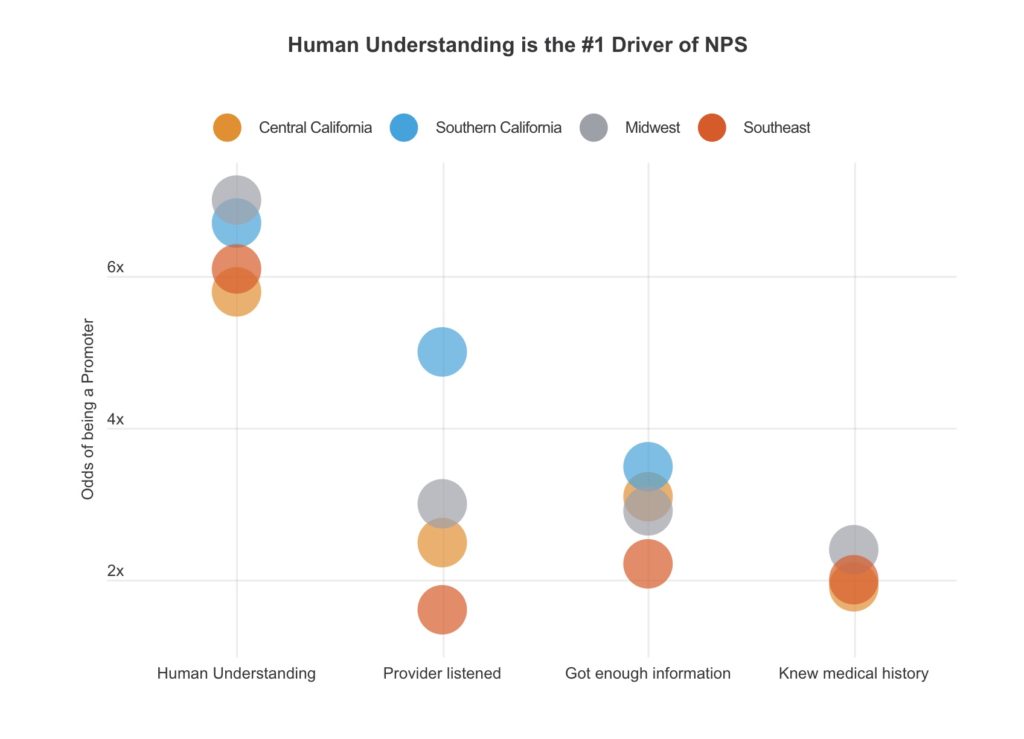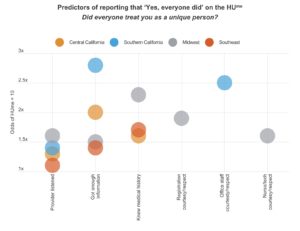NRC Health uncovers Human Understanding as the #1 driver of NPS
NRC Health, the leading provider of in-depth customer insights in healthcare, recently investigated drivers of brand perception in the market and drivers of experience perception following clinical encounters. The Human Understanding Metric (Hume)—”Did everyone treat you as a unique person?”—proved to be a powerful factor in both the market and the clinical setting.

Five Drivers of Experience Perceptions
So how should health organizations approach Human Understanding™? The NRC Health analysis—which analyzed data from Market Insights, the largest online healthcare-consumer perception study in the United States, measuring the opinions, behaviors, and characteristics of more than 300,000 people annually—highlights five key points:
- Healthcare consumers who report that everyone treated them as a unique person during their most recent healthcare experience at their top-of-mind hospital are 295% more likely to rate that organization’s overall image/reputation as “excellent.” The odds of a healthcare organization receiving an ‘excellent’ brand rating are more than nine times higher when healthcare consumers report that everyone treated them as unique. Market Insights data also shows that the odds of being a Net Promotor Score (NPS) Promoter are 12 times higher when patients report that everyone treated them as unique.
- Data from NRC Health’s Experience Feedback surveys, most of which are gathered within 48 hours of a clinical encounter, demonstrate that the extent to which people feel that everyone treated them as unique is the number-one driver of likelihood-to-recommend and, thus, of NPS. In percentage terms, patients were between 38% and 58% more likely to be a Promoter if they felt that everyone treated them as unique. Other measures that had a strong relationship with NPS across organizations were “the provider listened,” the patient “received enough information about treatment,” and, in the three organizations that included the item, “the provider knew the patient’s medical history.”

- Participants in a series of focus groups conducted by the NRC Health Human Understanding Institute discussed behavioral signs of Human Understanding—what being treated as unique means in the real world—and their views could be summarized as Connect with me, Listen to me, and Partner with me.
- There are tangible ways for health organizations and care teams to reinforce a commitment to connecting, listening, and partnering, benefiting patients and the people on the front lines of care.
- A focus on Human Understanding in clinical settings creates better care experiences for everyone involved and, in turn, drives likelihood-to-recommend. Patients carry that perception of Human Understanding into the marketplace, which then lifts the brand.
Why Connection, Listening, and Partnership Matters
When developing the Hume, the Human Understanding Institute at NRC Health conducted a series of focus groups to learn how people think about the concept. One discussion prompt was, “What does Human Understanding look like in the real world?” There is tremendous value in the simplicity of demonstrating Human Understanding through connection, listening, and partnership. Here are a few reliable ways to do this:
- Connection is about seeing patients as people…and showing it. Perhaps the simplest way to do this is to take a little time to go beyond the medical issue and establish a personal connection. A study led by Dr. Gregory Makoul, Chief Transformation Officer at NRC Health, is instructive: In initial encounters (i.e., between doctors and patients who had never seen each other before), a brief personal connection about a topic such as work, school, or family resulted in patients rating doctors as knowing them significantly better. The average time it takes to establish such a connection is 29 seconds.1 (It’s important to note that personal connections should not be limited to the initial encounter, however, as they help build rapport and relationships over time.)
- Listening is about more than hearing. Orienting oneself toward the patient and making eye contact while showing interest by leaning forward and reflecting or responding to what is said (without interrupting) are all markers of active listening. When care-team members are busy—and most are almost always extremely busy—being fully present can be hard, but encounters benefit when the patient and any companions in the room are focused on.
- Partnership is based on the notion of a meeting between experts. Specifically, clinicians are experts on clinical care, and patients are experts on their lives, much of which happens outside the care setting. There are many ways to show partnership—from checking understanding to engaging in shared decision-making to following up after an encounter—but one of the most straightforward is encouraging questions during the conversation. Of course, encouraging questions means more than asking, “Do you have any questions?” or “What questions do you have?” while wrapping up the encounter and walking out of the room; it requires demonstrating openness to hear and address those questions as well.
- Empathy is a line of continuity running through connection, listening, and partnership, but it may seem unrealistic to ask that providers convey empathy regularly. One productive way to think about empathy in the real world emerged from a study by Dr. Makoul and his colleague Dr. Carma Bylund, who found that when it comes to empathy, patients are primarily looking for acknowledgment that they expressed an emotion, progress, or challenge; pursuit in the sense of their listener being open to hearing more about it; and confirmation that it is legitimate to have a feeling about it.2 When construed in these practical terms, conveying empathy may seem less daunting. Acknowledgement, pursuit, and/or confirmation was the response to 85% of the empathic opportunities studied by Makoul and Bylund.
Human Understanding matters at the market level and the individual level because it is a direct pathway to excellent brand perception and an outstanding perception of the care experience. NRC Health’s Human Understanding Program is geared toward helping organizations measure market perception and track and improve the care experience. NRC Health also believes that Human Understanding is the key to health equity: Treating patients as individuals by trying to connect, listen, partner, and convey empathy as appropriate is the foundation for developing relationships that promote better health and more equitable healthcare.
For more case studies and nSights, visit NRC Health Resources.


